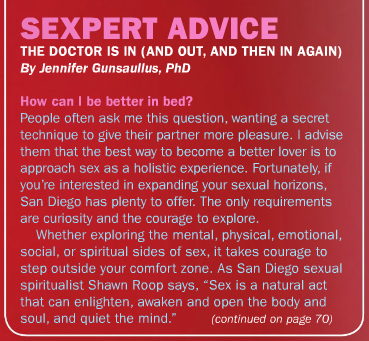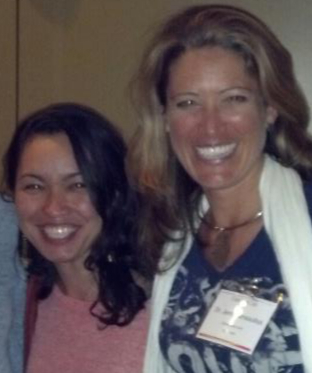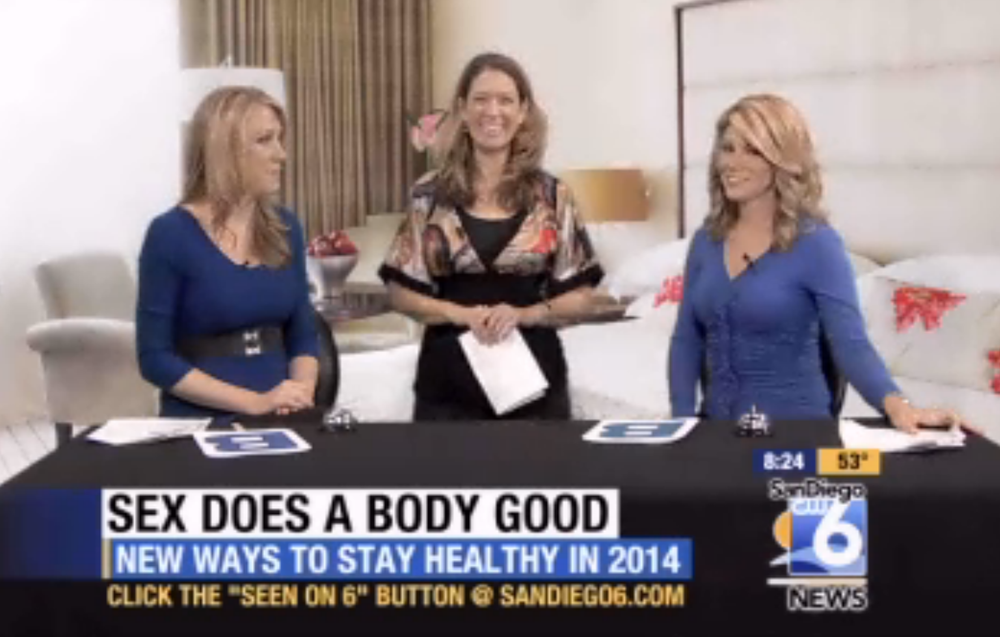Dear Dr. Jenn: How Can I Be Better in Bed?
/
"How can I be better in bed?"
People often ask me this question, wanting a secret technique to give their partner more pleasure. I advise them that the best way to become a better lover is to approach sex as a holistic experience. Fortunately, if you’re interested in expanding your sexual horizons, San Diego has plenty to offer. The only requirements are curiosity and the courage to explore.
Whether exploring the mental, physical, emotional, social, or spiritual sides of sex, it takes courage to step outside your comfort zone. As San Diego sexual spiritualist Shawn Roop says, “Sex is a natural act that can enlighten, awaken and open the body and soul, and quiet the mind.”
Mental
Sex Ed in school might have been uninspiring, but sex classes available in San Diego will make you want homework. Sexologist Dr. Sayaka Adachi teaches workshops at Déjà Vu Love Boutique in Vista and private home parties. She says classes like “Blow Him Away!” and “The Amazing World of Female Orgasm” are popular because they “teach the nitty-gritty of fun and easy techniques to pleasure a partner, while expanding knowledge of themselves and their partner.”
Dr. Adachi says that in the sexual realm, like everywhere else, knowledge is power. When asked what people incorrectly think they know about sex, she says with a laugh, “How big the clitoris is, let alone where it is.”
At Pleasures & Treasures Boutique in North Park, sex educator Alex West Moreau teaches a range of classes on improving sex and BDSM (bondage/discipline, dominance/submission, sadism/masochism).
“The most challenging thing for people to grasp in my classes is that it’s simply ok for them to want to explore their sexuality,” Moreau says. “Permission to explore is rarely given to oneself.”
While classes on BDSM may feel too risky for some, Moreau promises a “safe and secure environment for the public to learn how to explore deeper levels of themselves and connect more deeply with their partners.”

Physical
If you think that sex-toy stores have sketchy staff and offensive product packaging, then you need to visit a local gem, The Rubber Rose, in East Village. According to owner Lea Caughlan, the store is “simple and classy, with a carefully curated selection of bodysafe products, presented in a nonjudgmental, gender- and sexuality-neutral context, run by sex educators.”
The Rubber Rose commits to carrying only “skin-safe and nontoxic” products. As to the physical benefits of toys, Caughlan says, “Our bodies are physically invigorated when we orgasm.” For individuals who need greater stimulation intensity, or have experienced changes due to aging, illness or trauma, “Using toys can create a bridge and allow us to learn our bodies,” Caughlan says. “Toys can also create new dialogue between partners communicating new or different levels of desire and using the toys to play out fantasies.”
Beyond toys, learning how to move your body in new ways can build confidence and entice your partner. Pole dancing classes offer a sensual experience and heightened body awareness.
“Exercise makes you stronger, healthier and more confident, and those all make sex, and everything else in your life, better,” says Marie Davidson, owner of Fun Pole Fitness in North Park.
Emotional
February brings local performances of the award-winning play The Vagina Monologues, including at San Diego State University. The play promises to elicit from audiences a rollercoaster of emotional reactions: sadness, thoughtfulness, shock, amusement and a lot of laughter. Attending this show can be a healing experience for audience members.
“When we discuss such topics openly, we eliminate the sense of shame that too frequently surrounds them, and instead foster a sense of empowerment,” says Sharlene Castle, producer of the SDSU show. “We want women in the audience to feel proud of their vaginas and sexuality. We want men to understand and empathize with the female experience, and we want everyone to feel outraged about the injustices women continue to face — and then do something to change it.”

Social
Sex may be considered a private experience for many, but Kamala Devi, a Pacific Beach resident and sex coach, hosts monthly Tantra Talks, Poly Potlucks and Sacred Snuggle Parties.
“The first two are meet-and-greets for people interested in exploring new paradigms of connection, either by going beyond monogamy or making sexuality more spiritual,” says Devi, a star of the Showtime series Polyamory: Married & Dating. “The Sacred Snuggle parties are more like laboratories to express your boundaries and desires for touch, intimacy and sensuality.”
For beginners, these sexual-social environments might feel intimidating, so Devi emphasizes safety. “We give a warm welcome to newcomers and discuss social agreements such as consent, confidentiality and celebrating diversity,” she says. “People are welcome to come and watch and learn; they don’t even have to speak.”
Spiritual
The spiritual component of sex explores being present in the moment. Golden Hill resident Shawn Roop, who teaches spiritual workshops, says U.S. culture is missing “a personal sacred sense of sex. Fantasy, escapism and shame have ripped the grace and beauty sex offers each of us.”
Roop addresses this missing piece by teaching that “men and women have different ways they approach sex. I empower women to understand how to have sex that meets their needs beyond just the physical act. I share with men how to engage sex from a more vulnerable place.”
(This was originally published by Pacific San Diego Magazine in February 2014.)
~Dr. Jenn Gunsaullus, San Diego, Sexologist, Sexuality Speaker, Sociologist













































